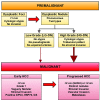Molecular pathogenesis of hepatocellular carcinoma and impact of therapeutic advances
- PMID: 27239288
- PMCID: PMC4870992
- DOI: 10.12688/f1000research.6946.1
Molecular pathogenesis of hepatocellular carcinoma and impact of therapeutic advances
Abstract
Hepatocellular carcinoma (HCC) is a leading cause of cancer mortality and has an increasing incidence worldwide. HCC can be induced by multiple etiologies, is influenced by many risk factors, and has a complex pathogenesis. Furthermore, HCCs exhibit substantial heterogeneity, which compounds the difficulties in developing effective therapies against this highly lethal cancer. With advances in cancer biology and molecular and genetic profiling, a number of different mechanisms involved in the development and progression of HCC have been identified. Despite the advances in this area, the molecular pathogenesis of hepatocellular carcinoma is still not completely understood. This review aims to elaborate our current understanding of the most relevant genetic alterations and molecular pathways involved in the development and progression of HCC, and anticipate the potential impact of future advances on therapeutic drug development.
Keywords: HCC; hepatocellular carcinoma; liver cancer.
Conflict of interest statement
No competing interests were disclosed.
Figures


References
Publication types
LinkOut - more resources
Full Text Sources
Other Literature Sources
Molecular Biology Databases

